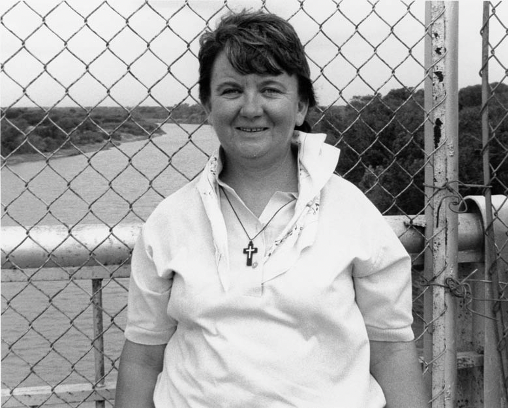After a Tetris game with the luggage, a couple of naps, and a karaoke session our group of students had finally made it to the Rio Grande Valley. Looking out the window of the twelve passenger van, palm trees flooded my view. The green leaves flew in the warm spring breeze while Taylor Swift played on the radio; the week was set for our Spring Break service immersion trip. We planned to stay at the Basilica in San Juan, TX. This holy place, was home to a mini hotel with pebbled flooring and rustic wooden frameworks that created a welcoming feeling of home. While many students who attend St Mary’s University come from Harlingen, McAllen, and Brownsville, the well known towns were not our destinations. Instead we were to embark on a journey into life of the lesser known colonias in the Rio Grande Valley.This trip just a few hours from San Antonio, took us into another dimension, one where our faith and purpose grew stronger.
So we walked into the ARISE Command Center, the rich scent of coffee brewing greeted our nostrils, and the sweet taste of pan dulce from the local panaderia made our mouths water. Every staff member hugged and cared for us as if we were their own children. I felt instantly at home. The day consisted of presentations and home visits with community members. And this is how I learned about Sister Gerrie Naughton, the founder of ARISE Adelante, but to the residents she was La Monjita en la Bicicleta. Sister Gerrie cared and loved the community so deeply that her impact can still be felt everywhere. Although I did not get to meet Sister Gerrie, the women of ARISE embodied her mission and carried it with them as they walked along the same dirt paths that Sister Gerrie rode around on her bike. So I will take you on my journey to discover Sister Gerrie’s vocation and devotion to the colonias.
Sister Gerrie Naughton, one of the Sisters of Mercy came to the Southern most part of the US, along the Texas-Mexico border in the 1980’s. Excited about this region full of life and culture, Sister Gerrie was eager to connect to her new community and to find out how she could help. Having no prior plan in place, Sister Gerrie set out on her bicycle to visit families in the community asking them what they needed most. As she ventured out further on her daily rides, she came across some dirt roads, houses built piecemeal and a sprawling community overflowing with needs. It was obvious this area lacked basic infrastructure such as proper drainage systems, clean running water, or a consistent supply of electricity. There were even days when she could not make it across a single road because it had rained the day before and every road remained flooded. Throughout her time in the Rio Grande Valley, Sister Gerrie visited with many families, many of whom had recently immigrated from Mexico. These families were looking for a way to improve their economic situation and yearning to provide for their family. When asking what they needed most she received responses ranging from English classes, to help filling out government forms, and so much more.

In response to these concerns, Sister Gerrie began a non-profit in 1989: ARISE Adelante, in Las Milpas, Texas in the heart of these colonias. They are made of a mostly immigrant population who crossed over to seek more opportunities for better lives. Just two years after she first arrived in the Rio Grande Valley, ARISE came to life with the help of five other women from the community. This non-profit organization has now grown to encompass multiple community centers that continue providing a wide variety of services and classes and other learning opportunities for all. The legacy of Sister Gerrie goes beyond the building and the 501C non-profit status. What ARISE Adelante provided was the resources and structures that the colonias were not afforded. Sister Gerries showed these families that their daily struggles mattered and that she cared to assist them.
According the Texas Attorney General Colonia Prevention Database, a colonia is defined as, “substandard housing developments, often found along the Texas-Mexico border, where residents lack basic services such as drinking water, sewage treatment, and paved roads.”1 Texas Senate Bill 827 classifies colonias into three categories: red, yellow and green based on the risk to public health. 2 The classification system ranges from red colonias lacking access to potable water, unpaved roads, no access to sewage systems, and susceptibility to flooding. Yellow colonias may have some better conditions including potable water service with approved wastewater disposable systems, however they still lack adequate paved roads, proper drainage and solid waste disposal pick up services. Green colonias have access to all of these services and pose the lowest level of risk to human health. Colonias have purposely been written out of city plans for decades with no improvement to the basic necessities despite countless initiatives launched by the State of Texas. The conditions of colonias across the Rio Grande Valley and the entire Texas-Mexico border are unacceptable. These communities have been studied for decades and little progress has been made since. 3 These conditions impact every aspect of life both directly and indirectly. Studies show significant impact on a students’ ability to excel in the classroom, residents’ compromised immune system and increased susceptibility to contagious illnesses, and overall poor mental health.4 The Universal Declaration of Human Rights also states that, “Everyone has the right to a standard of living adequate for the health and well-being of himself and of his family including food, clothing, housing and medical care…” 5 The conditions of colonias clearly violate this standard set by the United Nations in 1948.

The need for clean water in the colonias has led residents to look for inexpensive alternatives to the water from the tap. Purchasing a water filtration system is a huge expense that not many residents can afford, so they rely on molinitos. Molinitos are small refill stations, usually located at a gas station or a corner store, where one can refill five-gallon jugs.6 These jugs can weigh up to forty-five pounds and become an obstacle for a family who does not have a vehicle, a refill station near by, or simply for youths not strong enough to pick it up.7 The areas in which colonias are located are also prone to flooding, making roads inaccessible and with stagnant water that foster mosquitoes born illnesses. These waters emit unpleasant odors and can pose huge health risks for residents.8 The flooding leaves behind massive amounts of mud that residents must tread through to get to the school bus in the morning, leaving students with muddy all over their shoes and a clear indication of which side of town from where they come. 9
When Sister Gerrie Naughton arrived in the town of Las Milpas in 1987, these were the conditions she found this community in. Shortly after, she became she brought with her tremendous hope to each colonias community and became known as “la monjita en la bicicleta.”10 She listened and engaged with each community and took actions to help improve daily lives individually and collectively. The inadequacies described above posed and continue to pose severe health risks to the community members and have not been properly addressed by county officials. Sister Gerrie and the women of ARISE developed community programs to help alleviate the burdens felt by their neighbors. English lessons, information sessions to apply for residency or citizenship (depending for what one qualified), after-school and summer programs for the youth at new community centers and celebrations that glorified their culture and roots, ARISE provided a safe haven for each segment of the community. 11
Since their founding in 1989, ARISE Adelante has developed six different pillars of focus and has created community led teams to spearhead events, fundraisers, demonstrations, and petitions to advocate for and educate the community. These pillars include education, environment and health, housing and infrastructure, immigration, civic engagement and leadership, and spiritual development. 12

Each pillar has specific courses and events attached to it that are organized and executed by community members. Through these pillars, ARISE Adelante, with the leadership and direction of Sister Gerrie, has lifted their community higher than any of them could have ever imagined. The organization now has four centers across the region with over one hundred volunteers. One thing that Sister Gerrie instilled in this group was, “We will not do for the community what they can do for themselves.” Volunteers developed many self-help classes and seminars to empower its members. By advocating for better infrastructure, better schools, and providing a safe space for people of any religion, ethnicity, and income, ARISE has become a home away from home for countless individuals. The leadership, all women, has also become a model for the community. There is so much beauty in the fact that ARISE Adelante is a non-profit organization completely led by women. These women have created a support system, not only for volunteers but for all women across their communities. No matter their background, they support one another in every endeavor and bond over mutual experiences. Sister Gerrie fostered a sense of pride that had been lost.13 She expected from the community, not for perfection but excellence, because only God is perfect.
Although Sister Gerrie passed away in 2009, her legacy lives on. She serves as an inspiration to all women led organization and provided a true example of working within a community, with the community, for the community. The women of ARISE continue to follow Sister Gerrie’s lead as their beacon of hope and prosperity. Despite the great progress that has been made, the colonias of the Rio Grande Valley have sprawled on and require many further improvements. Nonprofits such as ARISE Adelante shed a much need spotlight on the disparities that exist across the region in disparate infrastructure and access to education. ARISE Adelante succeeded by mobilizing the community toward a common goal and ensuring that their voices were heard. Unfortunately, many city and county officials remain unwilling to listen. Statewide elections in recent years have also set the momentum back. By redirecting or removing funds from the Colonias Project out of Texas A&M- San Antonio, Governor Abbott has single-handedly stalled research into these communities. Alongside the lack of funding for adequate housing and infrastructure improvements such as public lighting and paved roads, community leaders must wind their ways through processes that require seventy-five percent of the original landowner’s signatures for petitions before they can come before committee for consideration. Nevertheless, the fight continues. The women of ARISE Adelante focus their daily efforts to educate their community and build from the ground up following the lead of Sister Gerrie Naughton.
- The Attorney General of Texas, “Colonias Prevention,” (2015) https://www.texasattorneygeneral.gov/divisions/colonias-prevention . ↵
- Texas Office of the Secretary of State Colonias Initiatives Program, “Tracking the Progress of State-Funded Projects that Benefit Colonias,” (2014) https://www.sos.state.tx.us/border/forms/2014-progress-legislative-report.pdf . ↵
- Mark Estes, Kingsley E. Haynes, and Jared E. Hazleton, “Colonias in the Lower Rio Grande Valley of South Texas: A Summary Report,” Policy Research Project Reports University of Texas at Austin 18 (1977). ↵
- Center for Public Policy Priorities, “State of Texas Children 2017: Child Well Being in the Rio Grande Valley,” Texas Kids Count Project October (2017). ↵
- United Nations, Universal Declaration of Human Rights, (1948), accessed October, 4, 2020, https://www.un.org/en/universal-declaration-human-rights/ . ↵
- Wendy Jepson and Heather Lee Brown, “‘If no gasoline, no water’: privatizing drinking water quality in South Texas colonias,” Environment and Planning 46(2014): 1038-1048. ↵
- Wendy Jepson and Heather Lee Brown, “‘If no gasoline, no water’: privatizing drinking water quality in South Texas colonias,” Environment and Planning 46(2014): 1038-1048. ↵
- Irma N. Ramos M.D., Marlynn May, PhD., and Kenneth S. Ramos, PhD, “Environmental Health Training of Promotoras in Colonias Along the Texas-Mexico Border,” American Journal of Public Health 91(April 2001): 568-570. ↵
- “Communities on the U.S. border ‘grow from within’,” Soli Salgado, publish June 6, 2016, https://www.globalsistersreport.org/news/ministry/communities-us-border-grow-within-40201. ↵
- “Communities on the U.S. border ‘grow from within’,” Soli Salgado, publish June 6, 2016, https://www.globalsistersreport.org/news/ministry/communities-us-border-grow-within-40201. ↵
- ARISE Adelante, accessed October, 4, 2020 http://www.arisesotex.org/ . ↵
- ARISE Adelante, accessed October, 4, 2020 http://www.arisesotex.org/new-page-5. ↵
- “Communities on the U.S. border ‘grow from within’,” Soli Salgado, published June 6, 2016, https://www.globalsistersreport.org/news/ministry/communities-us-border-grow-within-40201. ↵



65 comments
Estefania Walther
Stories like this are very informative and inspirational. It is so sad how there are many communities that are in poverty and aren’t able to help themselves. For example, even in larger cities there are certain areas and communities that are struggling while the rest of the area is fine due to opportunity and economic status. When the city is smaller and doesn’t have much population, it is easier for the rest of the state to forget about these places in need and are somewhat forgotten. We all can make a change by informing ourselves about the issues at hand and working together to create change in our beautiful communities.
Jacqueline Galvan
This article was a great representation of the colonias just south of us in San Antonio. Hearing Sister Gerrie Naughton’s work in the 90’s to help better support these communities along the border with minimal abysmal infrastructure. The lack of help from the government and the writing off of these communities was a shock to me, and something that Sister Naughton recognized was wrong.
Sudura Zakir
Very informative and detailed article, I enjoyed reading it. From personal experience to comparison and connecting it. Overall it was great writing. It was motivational and focusing on living conditions of many people. The intro part drew my attention a lot for going through this whole article. I personally felt inspired reading it. The context of your own experience is powerful part of the whole writing.
Yaniev Ibarra
Amazing article Andrea! Your writing style is so descriptive and easy to read. Plus, it is an informative article on a Rio Grande Valley legacy, Sister Gerrie. She continues to inspire generations to advocate for the Mexican-American community not only through ARISE but through the mark she left on people and her strong advocacy. Wonderful tribute to her! Valley Proud!
Osondra Fournier-Colon
The incredible story of a woman doing all she can for a community that has practically been left to rot and disappear. Sister Gerrie is a great inspiration that people can make significant changes no matter where they’re from, and it is never too late to fix what has been broken. This article makes me want to visit the colonias and experience the culture that has been preserved and built. The Civic engagement of helping and providing for those in need is a beautiful service for those who struggle and those who do not see the struggle.
Xavier Bohorquez
ARISE has always been an organization that I’ve been seeing more often in my research regarding Texas immigration and I’m glad that I got to be more informed and educated. They have always provided through major events in south texas and I was happy to see a lot of new information I never got the chance to get into.
Joseph Frausto
I found the use of narrative to begin this look into the ARISE Adelante to be an interesting device that helps accent the very personal story of Sister Gerrie Naughton. The fact that the sister was able to found a Catholic charity that does not specifically focus on what one would typically classify as “religious” issues illustrates the core of Marianist charity and seeking social justice through religion.
Olivia Flores
I continue to hear of stories of undeveloped cities in Texas struggling for care. Reading this story only motivated me to work even harder to advocate fro change. The bigger cities in the state such as San Antonio, Dallas, and Houston are very much big project staples. Although they are big cities there is also plenty of poverty and overlooked communities. So even somewhere as small as the Rio Grande Valley is going to struggle even more. The ARISE organization is truly an inspiring story and needs to continue to be heard and talked about. To create change for communities we have to be willing to do the hard work to get there.
Aaron Onofre
Angela! This article was well written and the imagery you used made it feel as if I was right there in the story, watching everything unfold with my own eyes. It is great that an organization was made to not only support this neglected community but also build up the community, promoting self-empowerment and determination in each of the community member’s lives.
Rosa Inocencio
Hello Angela, this is a very well-written and informative article. As someone who is also from the Rio Grande Valley I did have some knowledge of some areas being really bad but I never really went into much detail because I myself too did not have many resources when I lived there. I think it is very interesting that you and many others were able to go and learn more and ya’ll came upon this non-profit organization known as ARISE. It is very interesting and just very heartwarming knowing that there are still individuals out there that are willing to help those, especially immigrants who come to a new country to have a better life. This article really made me want to go and become part of this organization because I myself would have wanted to have help too back then. Great Article